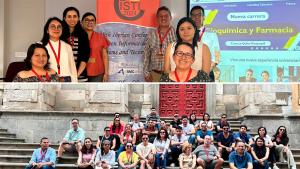UPS research group presented its research at the Smart Cities Ecuador Congress
UPS research group presented its research at the Smart Cities Ecuador Congress
Quito,
martes 27 julio 2021
Lina Zapata; Juan Cárdenas, Tatiana Mosquera and Paola Carrera
The Research Group "Development of applications and software based on ICTs" presented four of its projects during the International Congress "Smart Cities Ecuador". For two days, companies and institutions presented their innovative projects in Swissotel Quito.
Students Bryan Beltran, Boris Tarapues, Joseph Arias and Daniel Bermeo, and professors Lina Zapata, Franklin Hurtado, Silvana Vargas and José Luis Aguayo presented the following projects:
• Turismo Comunitario: A website to promote tourist attractions and community business ventures.
• Parqueadero inteligente: system for recognizing available parking areas by processing images captured by a network of video cameras.
• Procesamiento de imágenes: Computer Vision temperature measurement system.
• Sistema de Posicionamiento Global (GPS) Mobile application for users to disseminate the presence of the garbage collector in a specific sector of the city of Quito, using GPS.
Lina Zapata, was invited as a speaker and presented her research on sustainable public transport which seeks to contribute to a sustainable and eco-efficient management for the city of Quito. Based on mathematical algorithms and numerical studies, she showed the viability of this project in this field.
Lucía Bellocchio stated that a smart city is one that places people at the center of development, incorporates technologies in urban management and uses these elements as tools to stimulate the formation of an efficient government that includes processes of collaborative planning and citizen participation. By promoting integrated and sustainable development, smart cities become more innovative, competitive, attractive and resilient, improving lives. "The future is not about what is going to happen, but about what we are going to do," she quoted writer Jorge Luis Borges.
Juan Cárdenas, UPS president, was at the event and learned more about students' proposals. He believes the research and strategies that emerge from academia must be presented because they offer alternatives that respond to different social problems. "These events are important because they connect researchers, academics, entrepreneurs who seek to propose solutions that improve people's lives," he said.





Follow us
Follow us